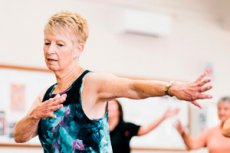Aerobic exercise in the evening is more beneficial for older hypertensive patients than morning exercise
Sist anmeldt: 14.06.2024

Alt iLive-innhold blir gjennomgått med medisin eller faktisk kontrollert for å sikre så mye faktuell nøyaktighet som mulig.
Vi har strenge retningslinjer for innkjøp og kun kobling til anerkjente medieområder, akademiske forskningsinstitusjoner og, når det er mulig, medisinsk peer-evaluerte studier. Merk at tallene i parenteser ([1], [2], etc.) er klikkbare koblinger til disse studiene.
Hvis du føler at noe av innholdet vårt er unøyaktig, utdatert eller ellers tvilsomt, velg det og trykk Ctrl + Enter.

Aerobic exercise is more effective at regulating blood pressure when done in the evening than in the morning. Researchers conducting a study in elderly patients at the School of Physical Education and Sport of the University of São Paulo (EEFE-USP) in Brazil found that evening exercise was better at regulating blood pressure due to improved cardiovascular control by the autonomic nervous system through a mechanism known as the baroreflex. The study was published in The Journal of Physiology.
“There are multiple mechanisms for regulating blood pressure, and while morning exercise was beneficial, only evening exercise improved short-term blood pressure control by enhancing the baroreflex. This is important because the baroreflex has a positive effect on blood pressure regulation and there are currently no drugs to modulate this mechanism,” said Leandro Campos de Brito, first author of the paper.
The study was part of Brito’s postdoctoral project, which is supported by FAPESP and is supervised by Claudia Lucia de Moraes Forjas, professor at EEFE-USP.
The study involved 23 elderly patients diagnosed and treated for hypertension, who were randomly assigned to two groups: morning training and evening training. Both groups trained for ten weeks on a stationary bike at moderate intensity, three 45-minute sessions per week.
Key cardiovascular parameters such as systolic and diastolic blood pressure and heart rate after ten minutes of rest were analyzed. Data was collected before and at least three days after completing the ten-week training.
The researchers also monitored mechanisms related to the autonomic nervous system (which controls breathing, heart rate, blood pressure, digestion, and other involuntary body functions), such as muscle sympathetic nerve activity (which regulates peripheral blood flow through the contraction and relaxation of blood vessels in muscle tissue) and baroreflex (an assessment of blood pressure control through changes in muscle sympathetic nerve activity).
The evening training group improved all four parameters analyzed: systolic and diastolic blood pressure, baroreflex, and muscle sympathetic nerve activity. The morning training group showed no improvement in muscle sympathetic nerve activity, systolic blood pressure or baroreflex.
"Evening training was more effective in improving cardiovascular autonomic regulation and lowering blood pressure. This can be explained in part by the improvement in the baroreflex and the reduction in muscle sympathetic nerve activity, which increases in the evening.
"We now know that the baroreflex is a critical factor, at least from a cardiovascular perspective, in making evening training more beneficial than morning training, as it mediates the other benefits analyzed. However, much more needs to be done to better understand the mechanisms involved," said Brito, who is now a professor at the Oregon Health and Aging Sciences Institute in the US and continues to explore this topic through circadian rhythm research.
The baroreflex regulates each interval of the heartbeat and controls autonomic activity throughout the body. "It's a mechanism that involves sensory fibers and deformations of the artery walls in specific locations, like the aortic arch and the carotid body.
"When blood pressure drops, this area alerts the area of the brain that controls the autonomic nervous system, which in turn signals the heart to beat faster and tells the arteries to contract harder. If blood pressure rises, it alerts the heart to beat slower and tells the arteries to contract less. In other words, it modulates blood pressure beat by beat," Brito explained.
In previous studies, the EEFE-USP group showed that evening aerobic exercise lowered blood pressure more effectively than morning exercise in men with hypertension, and that the greater response to evening exercise in controlling blood pressure was accompanied by greater reductions in systemic vascular resistance and variability of systolic pressure.
“Replication of results obtained in previous studies and in different groups of patients with hypertension, combined with the use of more precise methods to assess the main results, strengthened our conclusion that aerobic exercise performed in the evening is more beneficial for the autonomic nervous system in patients with hypertension. This may be especially important for those who are drug-resistant,” Brito said.
